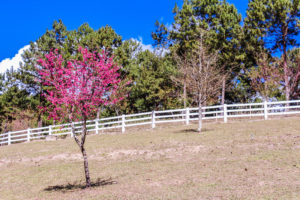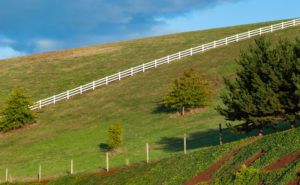
About Us
We are a leading fence contractor in Denver. For almost 50 years, our crew of expert fence installers has granted homeowners and businesses strong, high-quality fence products and installation assistance.…
Barbed wire, although somewhat dangerous, is one of the most durable types of fence that can be built to cage animals and separate sections of your fields and yards. There is a wide variety of tips and tricks to protect yourself while you build a barbed-wire fence. The right tips and tricks can turn the complicated task of building a barbed wire fence into something more manageable.

 Step 1
Step 1
Wear leather gloves when handling barbed wire. Although the fixed wire is not dangerous in itself, tensing the barbed wire can cause accidents in case of wire breakage. Although rare, the most likely result in case of cable breakage is that the wire can hurt your hands while you are handling it.
Step 2
Guide your work with a string. Although you can measure your posts with your eye to keep them as straight as possible, you should always use a string for more precise positioning. Tension the string between the posts in the corners at the termination points of each fence section and use that line as a reference when driving your T posts.

Step 3
Stretch the cable with a pulley ratchet. Although tightening the cable by hand is possible, the most effective way to get the wire stretched is with a pulley ratchet. Connect the tool to the cable that is being stretched and then connect the other end of the tool to something fixed, such as a tree, the hitch on the back of a truck or anything you can find. Turn the handle to stretch the wire.
Step 4
Set the wire clips with a couple of fencing pliers. Although normal pliers may be sufficient in case of trouble, fencing pliers have a hook-type tip specially designed to hold the curved part of a cable clamp, allowing you to easily rotate the clamp around the wire once to rotate the clamp in place.
Want some privacy on your deckchair or during a barbecue with friends? “Easy, just install a barrier!” Will retort some of you. The problem is that in this matter, the choice is (very) wide and that we get lost a little. Here are some well-crafted ideas for fencing your garden.

Fencing Your Garden At A Low Price
The most economical fence remains the fence, to choose roll or panel version (count 10 € per meter). Unattractive, it is, however, suitable if one wishes to grow a hedge, for example. The PVC fence costs between 50 and 100 € per meter, but it gets dirty very quickly (especially if it is white) and has a limited lifespan. If the fence in cases offers a very natural look at a low price (between 10 and 50 € per meter), it is however light and therefore unsuitable for terrain too exposed to the wind.
A Fence At The Top Of Elegance
 Traditional, the solid wood fence remains affordable (between 50 and 200 € per meter depending on the type of wood chosen) and offers maximum charm to the garden. The composite panel (between 150 and 300 € per meter) which mixes the authenticity of the wood and the solidity of the plastic. More expensive (around 150 € per meter), but with an optimal lifespan and completely blackout, the concrete wall is able to imitate stone or wood. Hyper design, the aluminum fence is also very resistant over time (count around 300 € per meter). Do you dream of an original garden fence? Opt for an openwork screening panel with geometric or floral patterns. They are available in aluminum or composite.
Traditional, the solid wood fence remains affordable (between 50 and 200 € per meter depending on the type of wood chosen) and offers maximum charm to the garden. The composite panel (between 150 and 300 € per meter) which mixes the authenticity of the wood and the solidity of the plastic. More expensive (around 150 € per meter), but with an optimal lifespan and completely blackout, the concrete wall is able to imitate stone or wood. Hyper design, the aluminum fence is also very resistant over time (count around 300 € per meter). Do you dream of an original garden fence? Opt for an openwork screening panel with geometric or floral patterns. They are available in aluminum or composite.
Garden Fence: What The Law Says
In reality, it is possible to install a fence between two lots, without even asking your neighbor for permission (unless he has the right of way over ours). But the elementary correction requires informing him. Similarly, no declaration is to be made in the town hall, except if our land is located in a protected area, on a protected or classified site, or if the municipality requires it (it happens!). If in doubt, ask her. However, the height of the fence is limited to 3.20 meters in cities with more than 50,000 inhabitants and 2.60 m in other municipalities. …
…